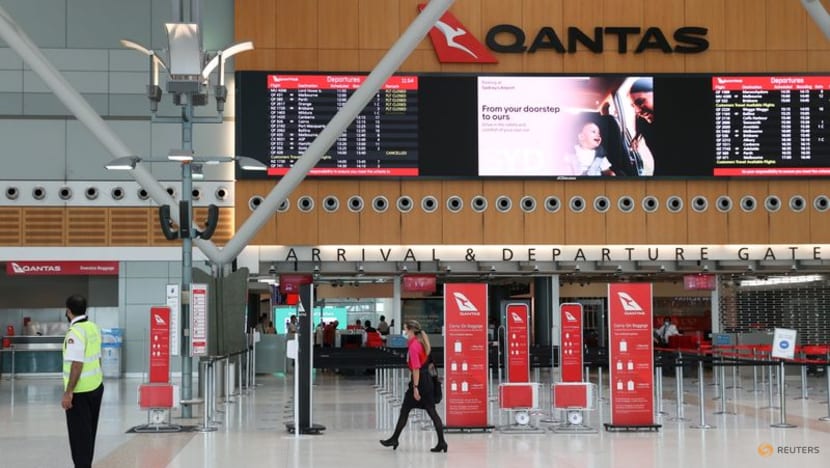
SYDNEY: Australian Prime Minister Scott Morrison announced on Friday (Oct 1) that an 18-month ban on Australians travelling abroad will be lifted from next month, easing one of the toughest COVID-19 restrictions imposed globally.
Reopening the international border for citizens and permanent residents will be linked to the establishment of home quarantine in Australia’s eight states and territories, Morrison said, meaning that some parts of the country will reopen sooner than others.
The first phase of the plan will focus on vaccinated citizens and permanent residents being allowed to leave Australia, with further changes expected to permit foreign travellers to enter the country.
“It’s time to give Australians their lives back. We’ve saved lives,” Morrison said during a televised media conference. “We’ve saved livelihoods, but we must work together to ensure that Australians can reclaim the lives that they once had in this country.”
Australia had shut its international border in March 2020.
Since then, only a limited number of people have been granted a permit to leave the country for critical business or humanitarian reasons.
Citizens and permanent residents have been allowed to return from abroad, subject to quota limits and a mandatory 14-day quarantine period in a hotel at their own expense. There have also been a few high-profile exceptions granted for entry for business purposes, including Hollywood actors to film movies and TV shows.
Families have been split across continents – an estimated 30,000 nationals were stranded overseas and foreign residents were stuck in the country unable to see friends or relatives.
More than 100,000 requests to enter or leave the country were denied in the first five months of this year alone, according to Department of Home Affairs data.
HOME QUARANTINE
Morrison also announced that vaccinated residents would be able to home quarantine for seven days on their return, dodging the current mandatory and costly 14-day hotel quarantine. People who are not vaccinated will be required to undertake 14 days of quarantine at a hotel when they return.
He expects the first home quarantine systems to be up and running in November, but the timetable will be set by individual states and territories.
The exact timing of the border reopenings will also depend on when Australian states reach their 80 per cent vaccination targets, and crucially on local political approval.
The most populous state of New South Wales currently has 64 per cent of those aged over 16 fully vaccinated and has indicated it will hit 70 and 80 per cent targets this month.
But most Australian states – most notably West Australia and Queensland – still have no widespread community transmission, are pursuing a strategy of “COVID-zero” and remain shut to other parts of the country.
Australian flag carrier Qantas welcomed Friday’s announcement, saying it would restart flights to London and Los Angeles on Nov 14.
Morrison said his government was working towards quarantine free travel with countries such as New Zealand when “safe to do so”.
An Australian government source said plans were being discussed to allow foreign visitors to enter the country, but it was not possible to yet state a timetable.
“FORTRESS OZ”
Expats and foreign residents gave the news a cautious welcome on social media forums. But experts said many Australians will remain cautious about booking travel for fear of snap lockdowns or other disruptions.
And the impact of the unprecedented period in the country’s history could be felt for years to come.
“Australia has been a fortress nation with the drawbridge pulled up to the rest of the world,” Tim Soutphommasane, an academic and former Australian race discrimination commissioner told AFP.
“What we’re seeing now with this announcement of borders being reopened is akin to Australia re-entering the world, and it’s long overdue,” he said.
A Lowy Institute poll in May showed that a plurality of Australians backed the tough border measures, with 41 per cent of those in support.
Only 18 per cent said fellow nationals should be free to leave.
Australia’s strict border closure has been credited with keeping both fatalities and infections relatively low. It has recorded just over 107,000 COVID-19 cases and about 1,300 deaths since the start of the pandemic.
The country on Friday reported 2,084 new COVID-19 cases, the bulk of which were detected in New South Wales and Victoria states. The results marked a small decline in case numbers from those reported a day earlier, but authorities warned against complacency.
Australia will also expand its list of authorised COVID-19 vaccines, allowing thousands of citizens and permanent residents still abroad to return via the home quarantine system, Morrison said.
Australia currently only recognises vaccines produced by Pfizer, Moderna and AstraZeneca.

Leave A Comment